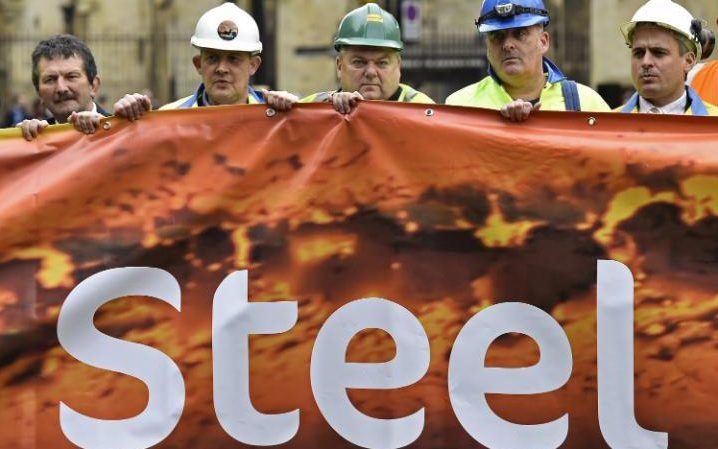Warning steel industry faces death sentence unless government steps in

The Government must step in to maintain production at Tata’s loss-making UK plants or risk customers abandoning them, signing a death warrant for the British steel industry, unions have warned as the crisis engulfing the sector intensifies.
A halt in output would mean customers ditching the UK’s steel sector, unions said on Monday as they challenged Business Secretary Sajid Javid to step in to provide a financial lifeline.
They also warned not to let Tata allow potential buyers to “cherry pick” the best assets from its UK operations, with one union chief warning staff could block a sale if this happened.
The developments came as Mr Javid – whose staff are running a damage control exercise over his handling of the crisis – met in London with Koushik Chatterjee, Tata Europe's chief financial officer, for crunch talks over the future of the company’s plants, which were thrown into jeopardy last week.
Tata’s Indian parent group said it would not keep pumping money into the giant Port Talbot plant – estimated to be losing £1m a day – and refused to back a turnaround plan which would require an immediate cash injection of at least £100m.
The decision saw the company hang a “For Sale” sign over its UK operations, which represent the vast bulk of the British steel industry, risking 15,000 direct employees and a further 25,000 in the Tata’s UK supply chain.
The union demands came after a meeting of steelworkers from across the UK, as they set out the steps they see necessary to save the industry. The event, staged by steel union Community and backed Unite, GMB and UCATT, saw workers list the moves they see as essential to saving the industry.
They have also secured a meeting with Mr Javid on Tuesday and say they want “immediate action” from Government, stepping in with a funding package until a buyer can be found, allowing Tata’s plants to keep producing steel and reassure customers.
They also warned against allowing a potential buyer to pick off the best assets, leaving what remained as an unviable business.
Roy Rickhuss, general secretary of Community, said: “Tata must live up to its commitment to be a responsible seller and give an assurance it will sell the business as a whole to keep it going. We are not naïve enough to think they won’t be tempted to break it up but the upstream and downstream parts of the business are dependent on each other.”
Tata has received approaches from several potential buyers – including commodities group Liberty House, which has already bought several other Tata steel plants – but one union official warned workers could block a deal in which the business is split up.
“There has been talk about a sit-in from some members,” said Harish Patel, Unite national officer. “Don’t rule it out.”
Mr Javid has previously said a sale of Tata’s UK plants would hinge on “three Ps – plant, power and pensions”, meaning the physical assets, the UK’s high energy costs and responsibility for the £14.5bn pension scheme linked to Tata.
The Business Secretary has repeatedly said his hands are tied from providing more support for the industry because of EU state aid rules, but has recently softened his position, saying “more can be done” to alleviate energy costs and the taking on the pension scheme, although this is relatively well funded with assets of £14bn.
However, Gareth Stace, director of trade body UK Steel, criticised the Government’s response to the crisis, which has been caused by cheap imports of Chinese steel, high power prices in Britain and onerous taxes.
“Power in Britain is £20 per megawatt hour more expensive than in Germany even after the latest Government interventions, and tariffs on imports must be made more robust,” Mr Stace said. “The situation is so grave the Government must push the boundaries and break through state aid rules if necessary.”
Worries about who could buy Tata’s operations were echoed in the Welsh Assembly, which was recalled to debate the crisis, highlighting the giant Port Talbot plant’s importance to the Welsh economy.
First Minister Carwyn Jones said: “The last buyer we want to see is an asset stripper, who might use the assets to make steel elsewhere in Europe.”
Tata is understood to have received several approaches, though talks are only at a preliminary stage. Liberty House, which has already bought Scottish plants Tata, is understood to be one, and its executive chairman Sanjeev Gupta is set to meet with Mr Javid and unions on Tuesday. Tata is also thought to have received overtures from Greybull, which is close to sealing a deal to buy the company’s Scunthorpe plant.
Mr Javid’s handling of the crisis has been questioned after he was recalled from a trip to Australia as the crisis came to head last week.
Last night his aides were forced to say the Business Secretary was in "complete control" of saving the steel industry and his department is in "crisis mode" after claims that he has been sidelined.
His spokesman went on a damage limitation exercise, insisting Mr Javid had a grip on the situation as Labour and unions questioned whether he was up to the job.
Speculation is rife in Westminster that Mr Javid has been pushed out after Oliver Letwin, the Cabinet Office minister, was sent to attend Monday’s meeting with Tata’s financial director.
David Cameron, the Prime Minister, will also take the lead in the talks on Tuesday when he meets with the Labour leader of the Welsh Assembly Mr Jones at 10 Downing Street.
A Whitehall fightback to protect Mr Javid started yesterday when the Prime Minister's official spokesman rejected criticism of Mr Javid and said Mr Cameron had confidence in Mr Javid's ability to take control of the crisis.
The spokesman also disclosed that Mr Javid met George Osborne, the Chancellor, on Monday to discuss any taxpayer involvement in a deal.